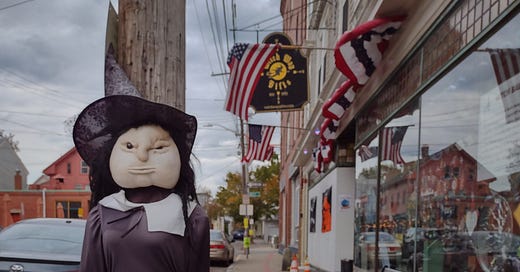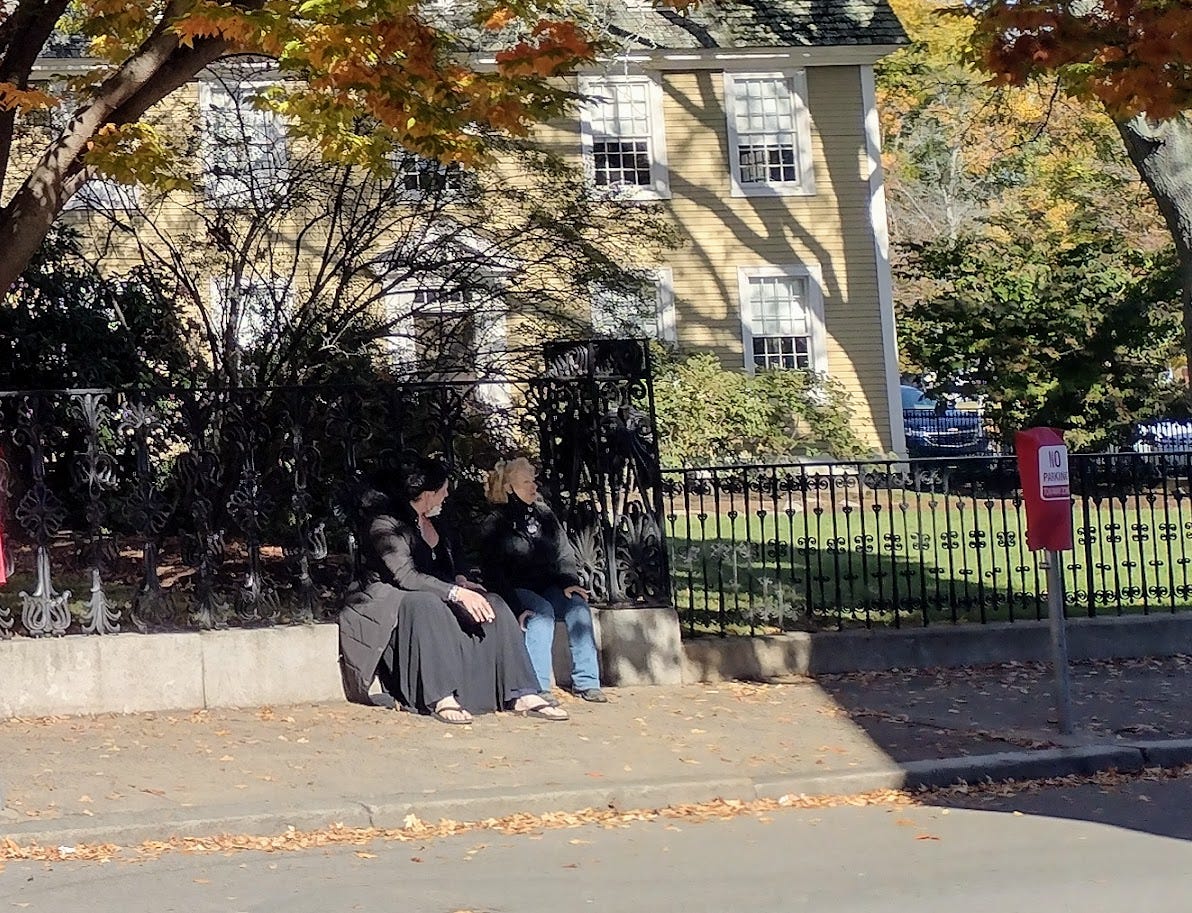Witch 🧹 Witch?
ANNETTE ON THE ROAD Northeast US, 2021, Day 5: Your Historian Considers Salem's Attractions
Right now, we’re not on our usual schedule of posts and podcasts at Non-Boring History. I’m in New England, with my tolerant spouse, He Who Shall Not Be Named On the Internets (HWSNBNOTI, pronounced Hoosen Benoti), and these are my posts from the road, with (as ever) a historical focus.
These dailyish on-the-road posts are a bonus for you as a paid subscriber of Non-Boring History.
Thanks for joining me and Hoosen on the journey!
SUPER IMPORTANT: Oh, and don't forget: Click the post title above to read this on the website. There, you can see the (essential!) photos, and read an up-to-date version with my latest edits. I always find mistakes after I hit “send” , and especially when I am writing on the road!
Yes, okay, I can't possibly visit every one of Salem's witch-themed attractions in a day. But I can visit some.
When I was last in Salem, briefly, in the 90s, I only remember one commercial witch museum, and one witchcraft shop. The shop had been opened twenty years earlier by an incomer and self-styled witch with the wonderfully New England name of Laurie Cabot. On her premises, I believe, Ms. Cabot conducted readings, and sold healing crystals (the latest new thing in the 90s) and other witchy whatnot.
I also recall that, as America's most out witch, Laurie Cabot was interviewed on TV every time a witch perspective on current events was required, usually at Halloween.
Now that Ms. Cabot has hung up her cauldron and broom, and retired, her shop nonetheless remains in business under her protege, who appears to employ a host of witches, at least one of whom I think I spotted taking a smoke break sitting across the street from the shop today.
Truly, though, this town is not what it was. Back in the 70s, Ms. Cabot and her kids were cruelly bullied by locals.
In a transformation since the 90s that I can only attribute to magic, half the good people of Salem now seem to be either witches, psychics, or historians, operating gift shoppes, walking tours, and museums.
Maybe Salem is a place with lots of psychic energy that's finally been unleashed. I've never been quite sure what psychic energy is. As something that I assume can only be felt, not observed, it makes my inner historian twitch. I'm not big on feelings as a replacement for facts and evidence.
What is Salem in the Early 21st Century?
Perhaps Salem is, in the words of a T-shirt sold here that Disney lawyers have yet to clap eyes on, a Disneyland for the Dead, or a Disneyland for “spiritual seekers” (twitch)
Or maybe it's just a place for regular Americans in search of escape from grim reality to exchange their summer Mickey Mouse ears and balloons for their fall witch hats and wands, unless they already did that at the Harry Potter theme park.
Speaking of which, is Salem just a darker Harry Potter for grown-ups who grew up with those books and/or movies, which, I hate to remind you, have now been around for more than two decades?
Salem is certainly what it has been for nearly four hundred years, a place where a lot of money changes hands.
Whether visitors’ interests are recreational, spiritual, or historical, they'll find loads of opportunities here to demonstrate their passions through the modern magic wands called credit cards, casting spells that turn cash into smoke.
An Advance Apology to Witches
I have a friend who's a witch. No, really. She's too nice to turn me into a toad (I hope) and I also trust she knows, if she's reading this, that I'm only doing my job. It's not personal.
But, and there's always a “but”, which is why historians don't get invited to parties . . . As a historian whose scholarly work dealt with early American popular religious culture (how people thought about and practiced faith) , I do find any religion that's emerged in America the past couple of centuries tends to make my eyebrows go up a bit.
Not that Wicca (modern witchcraft) began as an American thing. It seems to have started with a twentieth-century British civil servant who retired to Bournemouth.
A civil servant. In Bournemouth.
My British readers may now imagine my lip twitching beyond control, even as my American readers wonder what's funny, and perhaps think me probably judgmental (guilty as charged). My historian friends know that we know far too much about where a lot of things came from to take them seriously.
What can I say? I try to be nice. I try to keep my inner skeptic in line, at least in public.
Ooh, I have more friends I can mention pathetically to try to prove I'm not a witchophobic bigot! Among the people I befriended when I arrived in California were an absolutely lovely elderly couple called Betty and Jerry. Betty looked like a stereotypical grandma, plump with grey hair in a bun. Jerry looked like Grandpa from 1970s show The Waltons.
Betty and Jerry also believed in past lives and conversations with the dead, with whom they chatted via their “spirit guide”, a deceased American Indian. Apparently, indigenous people in the afterlife were happy to spend eternity helping white people get in touch with their ancestors, which I think was jolly generous of them.
I recall listening to my friends' accounts of their chats with folks from beyond the grave with as much composure as I could manage. I tried to be nice.
And unlike me, Betty and Jerry really were nice. Absolutely lovely. Just a bit different.
Anyway. Now you know who you're dealing with . . .
In the immortal phrase of every YouTuber in 2021, let's get started!
I wimped out of getting a psychic reading from a black-clad witch in Salem, or getting my photo taken in witch attire. But, on behalf of you, Nonnies, I did pop into a few shops, and visited a couple of classic Salem tourist traps at considerable expense.
Message for Readers on the Non-Boring History FREE Plan
I know how irritating it is for the paywall to rudely descend on you now. And I typically don't send you a post only to snatch it away like Lucy did with the football to poor Charlie Brown. But I do want you to know what you're missing, which is why I sent it at all.
And I want to make a case for why it’s important for you to subscribe on the paid plan if you possibly can. Subscriptions don't support a CEO'S luxury lifestyle at Non-Boring House. Subscriptions help me, Annette, pay costs associated with writing Non-Boring History, like buying tickets to tourist traps in Salem I otherwise wouldn't visit— seriously— so I can report back to you.
There’s never been a better time to become a Nonnie, a paid subscriber, as Hoosen and I carry on our journey! Best of all, sign up for a year with the Lobstah Special, and you get 20% off, PLUS you will keep the same rate when you renew. Details right here:





